LIPA ELITE Safflower Seeds are a powerhouse of nutrition, offering a healthy balance of protein, unsaturated fats, and antioxidants for birds.
✨ Molting Season Essential: Promotes glossy feathers • Supports immunity • Ideal for picky eaters
Why Smart Bird Owners Choose Safflower:
- ✓ 33% Less Oil than sunflower seeds – Prevents obesity while providing energy
- ✓ Linoleic Acid Rich – For smoother molting and vibrant plumage
- ✓ Selective-Eater Approved – Crisp texture attracts fussy birds
🔬 Nutritional Powerhouse:
15%
Protein
38%
Healthy Fats
12%
Fiber
Perfect For:
🦜 Molting Birds
🐦 Overweight Birds
🌟 Fussy Eaters
🎁 Special Offer: Get 10% Off Use code WELCOME10 + Free Shipping!
⏳ Limited stock
Safflower Seeds lower in oil than sunflower seeds, safflower supports feather shine, immune function, and energy levels — making it a great option for birds needing a cleaner, lighter diet. It’s especially beneficial during molting, seasonal changes, or periods of low activity.
Loved by budgies, cockatiels, lovebirds, finches, and parrots, safflower seeds also help reduce bad cholesterol and are often preferred by selective or sensitive eaters. Our seeds are hand-sorted, clean, and packed in food-grade, resealable pouches — keeping each grain safe and fresh.
Whether used alone or blended with other grains, Safflower Seeds are a smart, daily choice for natural bird health.
Why Choose Safflower Seeds for Your Feathered Friends?
Safflower seeds are a fantastic dietary option for birds, offering essential nutrients and a healthy alternative to common feed options. Known for their rich profile of vitamins, minerals, and healthy fats, safflower seeds ensure your feathered companions remain vibrant and active. If you’re searching for a way to enhance your bird’s overall health while providing them with something they love, safflower seeds are the answer. Let’s explore their nutritive content and the benefits for your birds.
Rich Nutritional Content of Safflower Seeds
Safflower seeds provide a rewarding combination of nutrients that support bird health. Below is a detailed table outlining the nutritional profile of safflower seeds:
| Nutrient | Description |
|---|---|
| Protein | Supports muscle growth and development, aiding in birds’ overall strength and vitality. |
| Healthy Fats | Provides energy and helps maintain feather quality and shine. |
| Fiber | Promotes digestion and prevents common digestive issues in birds. |
| Vitamins and Minerals | Includes vitamin E for immunity and calcium for strong bones. |
Key Benefits for Birds
Safflower seeds offer multiple advantages when included in your bird’s diet. These benefits go beyond basic nutrition and contribute to their overall happiness. Here’s what makes safflower seeds special:
– **Enhances Feather Health:** The healthy fats in safflower seeds are known to promote shiny and strong feathers, making birds look their best.
– **Encourages Selective Feeding:** Birds often find safflower seeds more appealing than less nutritious seed mixes, encouraging healthier eating patterns.
– **Suitable for a Variety of Species:** Whether you keep parrots, doves, or cardinals, safflower seeds are universally loved and beneficial for many bird species.
How to Incorporate Safflower Seeds Effectively
Integrating safflower seeds into your bird’s diet is simple, and it will immediately reap rewards. Offer them as a standalone snack or mix them into their existing food to add variety. However, moderation is key—providing them in balanced portions ensures your bird receives a diverse and complete diet.
With safflower seeds, you’re not just feeding your bird—you’re investing in their health, happiness, and longevity. Make the switch today and see your feathered friends thrive!
Safflower seeds are an excellent choice for bird enthusiasts looking to attract specific types of birds to their backyard feeder. Versatile and nutrient-rich, these seeds offer a healthy feeding option, particularly for cardinals, chickadees, and mourning doves. Beyond nutritional benefits, safflower seeds naturally deter squirrels due to their slightly bitter taste, saving both your feed and your time.
Frequently Asked Questions
1. What types of birds eat safflower seeds?
Birds like cardinals, chickadees, finches, and nuthatches are particularly fond of safflower seeds. Doves and sparrows also enjoy them.
2. Are safflower seeds safe for all birds?
Yes, safflower seeds are safe for most bird species commonly found at feeders.
3. How do safflower seeds deter squirrels?
Squirrels typically dislike the bitter taste of safflower seeds, making them less likely to raid your feeders.
4. Can safflower seeds be mixed with other bird feeds?
Yes, safflower seeds mix well with sunflower seeds and other bird feed blends.
5. Where is the best place to hang a feeder with safflower seeds?
Place feeders near shrubs or trees to allow birds an escape route from predators.
6. Are safflower seeds messy?
Not at all! Unlike other seeds, safflower husks are less likely to create litter under your feeder.
7. Do safflower seeds work in all types of bird feeders?
Safflower seeds can be used in tube, hopper, and tray feeders effectively.
8. Will safflower seeds attract pests?
Generally, safflower seeds are less attractive to pests like mice and squirrels.
9. How do safflower seeds benefit birds?
Safflower seeds are rich in protein, fiber, and healthy fats, promoting optimal nutrition and energy for birds.
10. Can safflower seeds be stored for a long time?
Yes, as long as they’re stored in a cool, dry place sealed from moisture and pests.
11. Are safflower seeds organic?
Some brands offer organic options; check your product labeling.
12. Do safflower seeds help during the winter months?
Absolutely! Their high-fat content provides birds with energy during colder seasons.
13. Are safflower seeds expensive?
Safflower seeds are competitively priced, offering great value for their benefits.
14. Can young birds eat safflower seeds?
Young fledglings can eat safflower seeds once they transition to solid foods.
15. Do safflower seeds expire?
Safflower seeds typically have a long shelf life if stored properly.
16. Will safflower seeds attract invasive species?
Safflower seeds usually attract native songbirds and are less likely to attract invasive birds.
17. Can I grow my own safflower plants?
Yes, safflowers can be grown easily in most climates with adequate sunlight.
18. Are safflower seeds good for feeders with rain guards?
Yes, safflower seeds stay dry and intact when used in feeders with rain guards.
19. Why are safflower seeds preferable over sunflower seeds?
Safflower seeds deter squirrels and appeal to a wider variety of birds.
20. Do safflower seeds improve backyard biodiversity?
Yes, feeding safflower seeds encourages visits from diverse bird species.
Raw Seeds
Foxtail Millet
Rich in carbohydrates, fiber, protein, and essential minerals like iron and magnesium, making it a highly digestible energy source for birds.
- Provides long-lasting energy and supports daily activity
- Aids digestion and maintains gut health
- Supports feather strength and quality
- Easy to digest — perfect for small and young birds
- Promotes healthy weight and natural foraging behavior
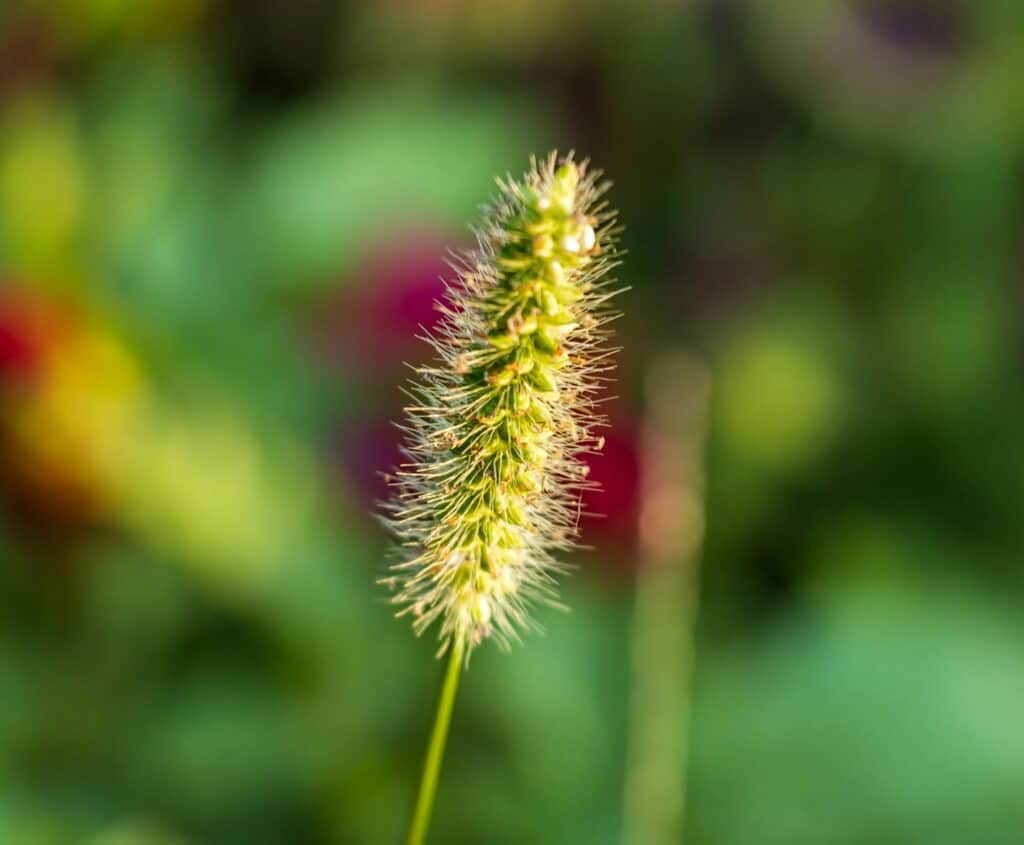
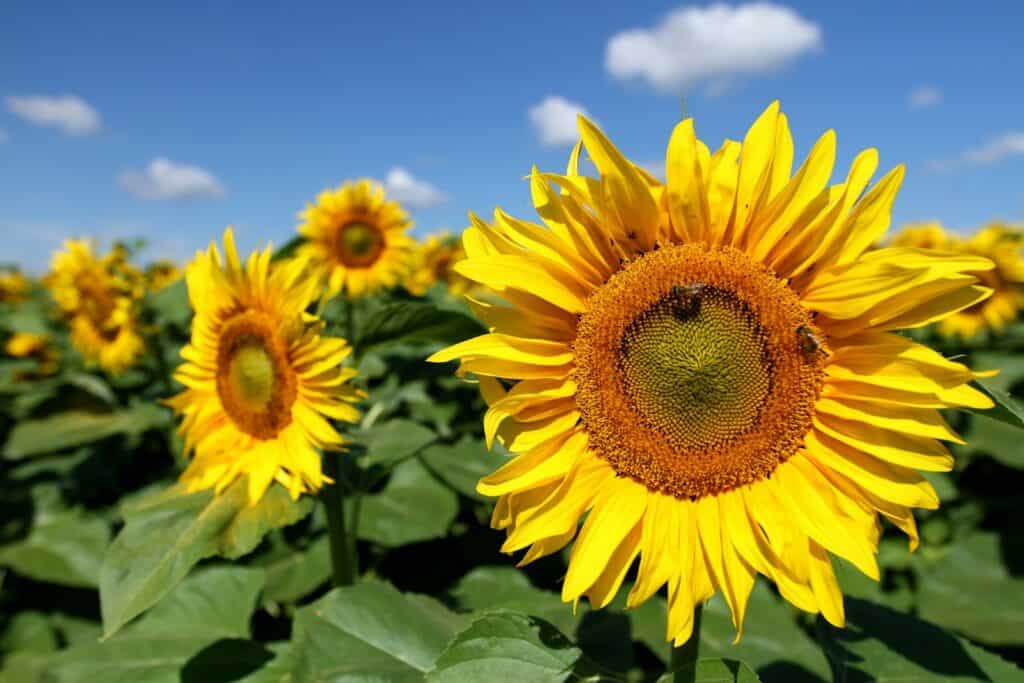
Sunflower Seeds
Packed with healthy fats, protein, Vitamin E, and B-complex vitamins — great for energy, feathers, and immune health.
- Promotes glossy, healthy feathers
- Boosts energy with natural fats
- Strengthens the immune system
- Supports bone health and activity
- Encourages natural foraging behavior
Safflower Seeds
High in protein, fiber, and healthy unsaturated fats — with antioxidants that support heart and feather health in birds.
- Improves feather shine and strength
- Supports heart and liver health
- Boosts natural immunity
- Aids digestion with dietary fiber
- Helps manage a healthy weight in birds prone to obesity
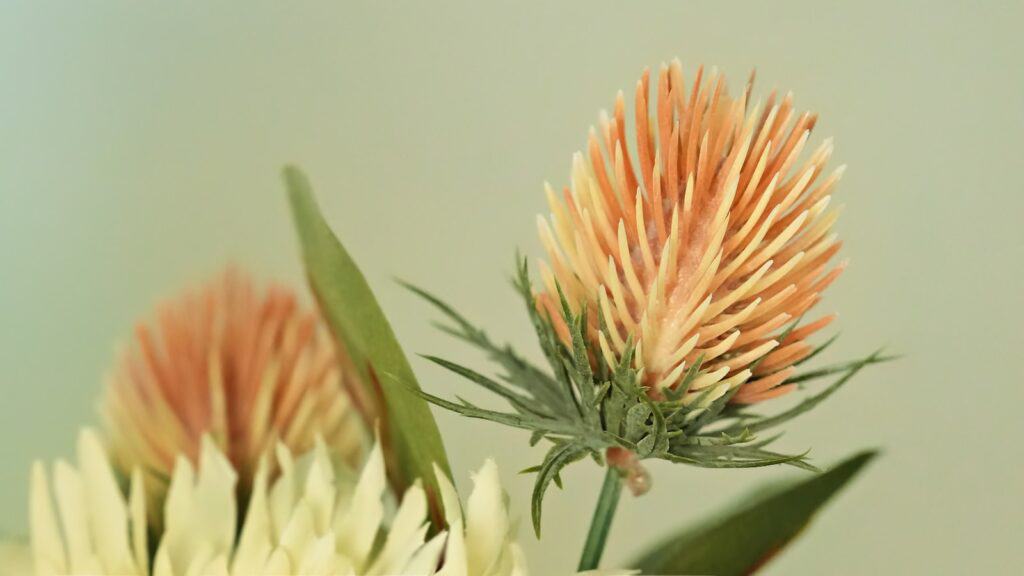
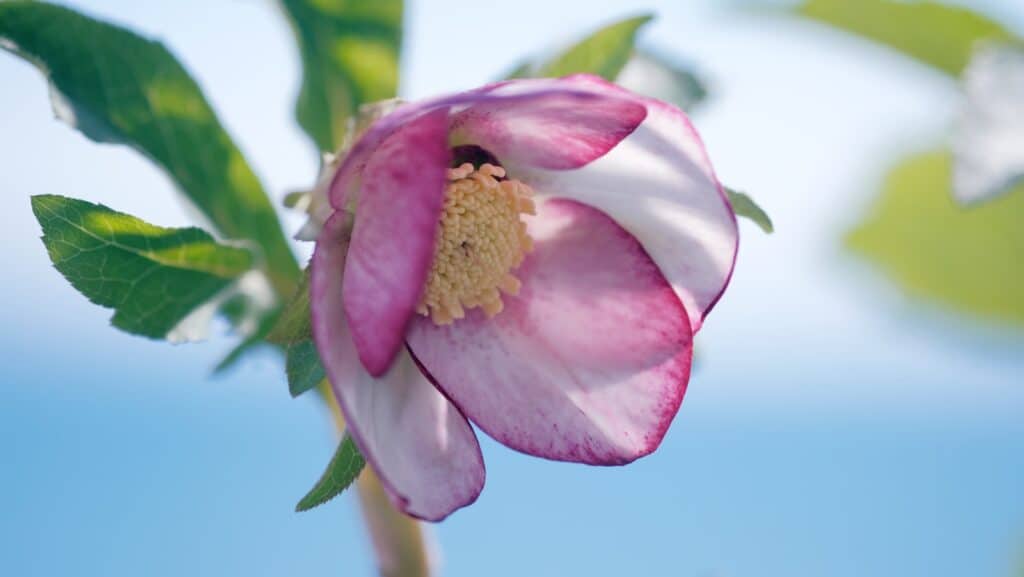
Mix Seeds
A diverse mix of millet, oil seeds, and grains offering balanced protein, fiber, essential fats, and minerals — ideal for daily avian nutrition.
Foxtail Millet, Kodo Millet, Proso Millet, Barnyard Millet, Niger Seeds, Flax Seeds, Sesame Seeds, Oats, and more.
- Provides complete and balanced daily nourishment
- Supports energy, muscle growth, and feather quality
- Promotes healthy digestion and gut activity
- Encourages natural foraging and mental stimulation
- Suitable for all seasons and multiple bird species

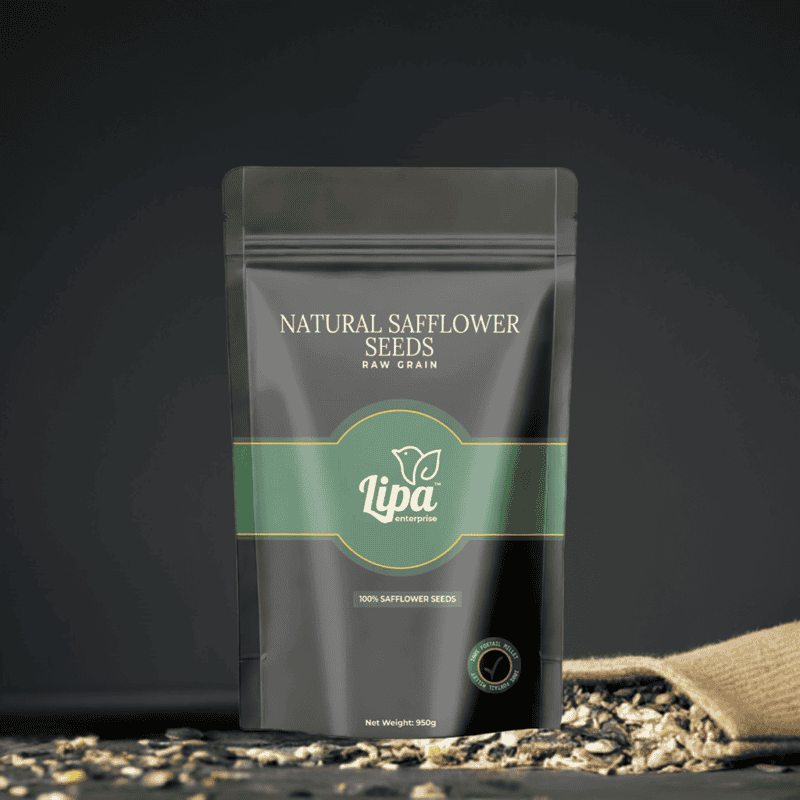
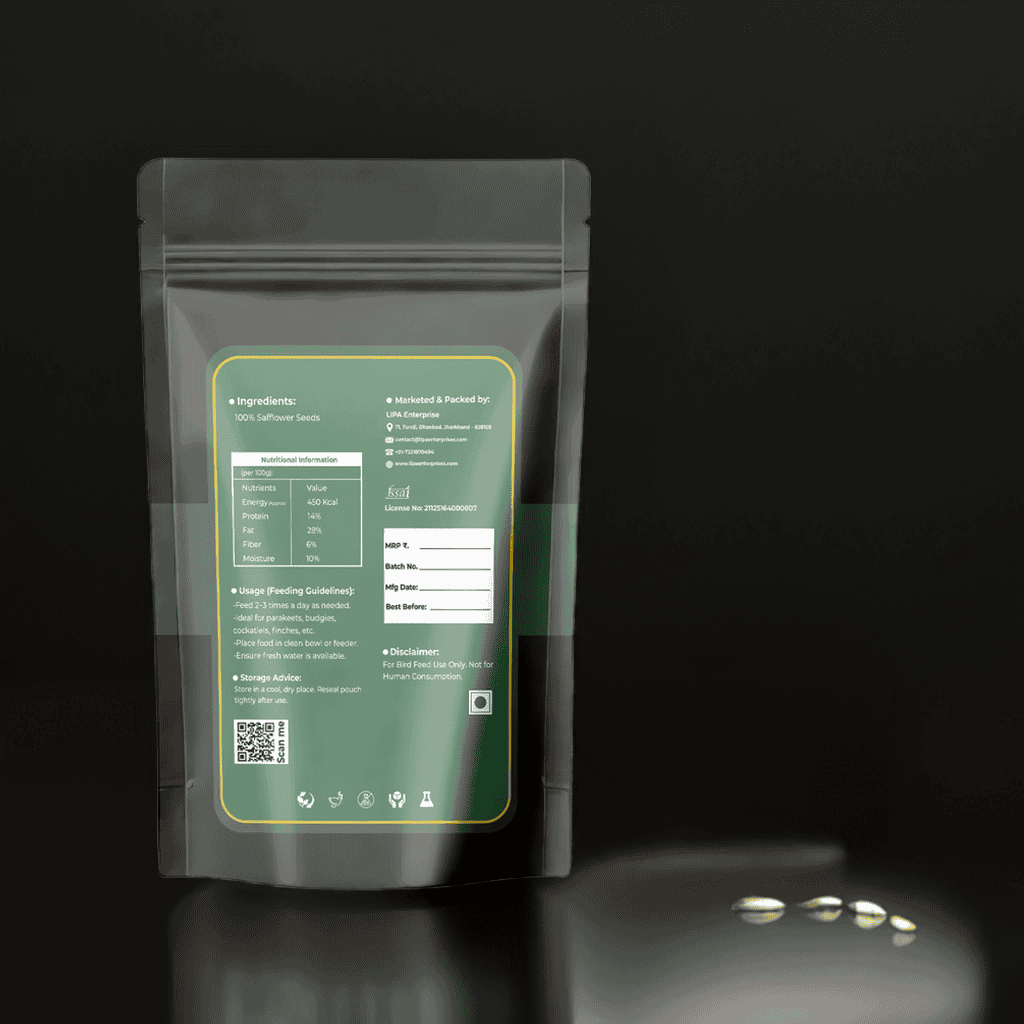



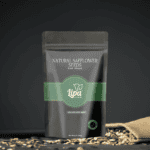
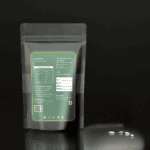


















Rohan Deshpande –
A breeding staple! Enhances egg fertility and keeps parents energetic. 10/10 for quality—no mold or dust like cheaper brands.
Vikram Joshi –
Vet-approved for weight control! My overweight cockatiel adores these low-fat seeds. Finally found a treat that’s both delicious AND nutritious.
Meera Srinivasan –
My picky African Grey finally loves a healthy snack! No more wasted seeds—just pure safflower joy. Feathers look glossier after 2 weeks!
Ananya Iyer –
Zero mess, zero filler! My doves clean the bowl entirely. Saves me so much cleanup time compared to mixed blends.
Priyanka Reddy –
Worth every penny! Birds eat every last seed, so nothing goes to waste. Actually cheaper long-term than budget mixes.
Priya Shah –
The happy chirps when I shake the bag! Heart-melting to see my rescue budgies finally excited for mealtime.
Aarav Khanna –
Lab-tested purity—no pesticides, unlike store brands. My parakeets’ energy doubled since switching. Never risking generic again!